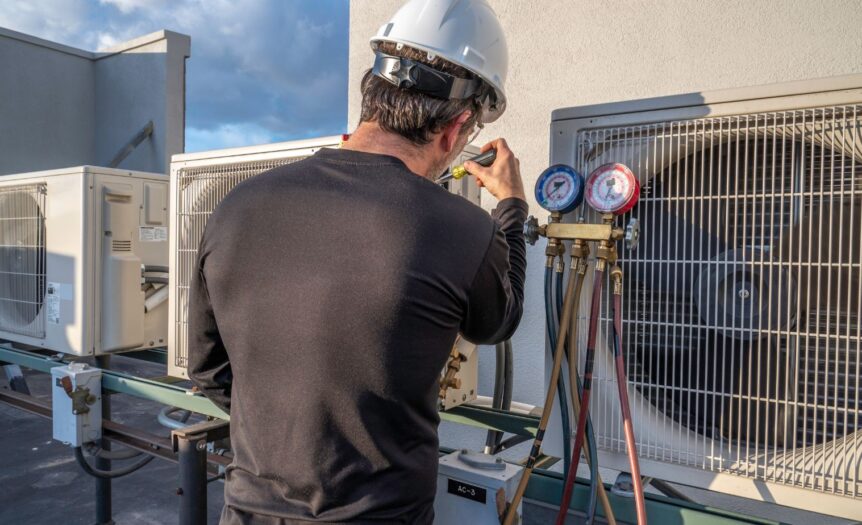HVAC systems are pivotal in maintaining indoor comfort during summers and winters. However, conventional HVAC systems heat up or cool down a house uniformly without considering whether there is a variation in the temperature of various rooms or parts of the house. That is quite inefficient and does not keep the spaces comfortable while increasing the cost of energy. The solution to this challenge is HVAC zoning. This refers to the ability of homeowners to control the temperature in one area- a zone of their home independently from other zones. By zoned segregation, HVAC zoning systems can provide customized comfort and a substantial energy economy. In the following article, we will learn how these systems work and what advantages they offer.
How HVAC Zoning Systems Work
HVAC zoning works by partitioning a home into several sections, with each section being allowed to have its own thermostat and temperature control. A zoning system incorporates dampers installed inside the ducts to regulate the volume of air to various sections of a house. Such dampers open and shut depending on the thermostat settings in each zone. For example, if one room needs more cooling, the system can send more cold air that way while reducing airflow to the other rooms.
The thermostats in each zone talk to a central control panel that opens or closes dampers accordingly. This allows different zones to have different temperature settings independent of each other. In such a scenario, one could keep the remaining areas warmer or cooler as the usage pattern or personal comfort may demand.
Advantages of Zoning Your HVAC System
One of the biggest advantages with an HVAC zoning system is tailoring a temperature to different areas of the house. Most households tend to have rooms used much more than others. A bedroom would need to be much cooler during the night hours, whereas a living room may want to be heated much more during the day. A zoned system allows you to adjust each room to the perfect, desired temperature for whoever occupies it.
Zoning also eliminates one of the most common complaints associated with uneven heating and cooling problems. The upper floors of multi-story homes tend to get too warm, while the lower ones stay cool. Since zoning gives you the ability to set a specific temperature on each floor, this will keep your home comfortable from top to bottom.
Energy Efficiency and Cost Savings
The other important advantage of HVAC zoning relates to energy efficiency. Usually, in an ordinary HVAC setup, even if the parts of the house are unoccupied, temperature goes to the set value everywhere inside the house. Therefore, it causes wastage of energy and unnecessarily jacks up utility bills. On the contrary, zoning permits the economization of energy usage in areas that are not in service.

For example, if you are spending most of your time in the living room during the day, you may turn the heating or cooling down in other parts of the house not in use, such as the bedrooms or basement. Since you will be conditioning only the space you are in, this decreases an incredible amount of energy waste.
Again, zoning systems help to reduce the workload on your HVAC unit. This is because the system, instead of trying to work at sustaining one set temperature point for the whole house, only needs to make changes in temperature for the specific zones. This would mean your HVAC operates more efficiently and could lead to a longer life span and reduced maintenance costs.
Fixing Air Conditioning Issues in Zoned Systems
Air conditioning failure is a general problem people face with HVAC systems, even on zoned setups. If the air conditioning unit is not working right, comfort in the home is affected, even if you have a zoning system in place. General problems range from a lack of cool air to uneven cooling to having the system shut off unexpectedly.
Clogged or dirty air filters obstruct the flow of air and make the operation of the air conditioning system tougher when cooling your home. Cleaning or replacing filters can resolve these issues by improving cooling efficiency. When you cannot fix air conditioning issues yourself, then it calls for an air conditioner repair. A qualified technician can diagnose and repair problems and maintain your system to be efficient and comfortable in each zone.
Customized Control
With HVAC zoning, the temperature can be set based on each family member’s preference. For people who have different preferences about the use of heating or air conditioning, zoning can meet the needs of all so they can remain at their ideal comfort. For instance, some people might need cool bedrooms at night, while others prefer sleeping in a warm environment. Using independent thermostats inside every zone, everyone can manage their place as they like it without actually disturbing the entire house.
Smart zoning systems can be connected to smart thermostats with options for homeowners to control their zones from anywhere using smartphone applications. For more convenience, smart zoning systems are going to allow you to change the temperature in your home even when you are away from your home for comfort and energy savings.
Types of HVAC Zoning Systems
There are a lot of ways to zone an HVAC system. A homeowner could have a ducted system with computer-controlled, motorized dampers that regulate airflow into each zone. Other homeowners may use a ductless mini-split system, which would mean having individual air handlers in each room or zone of the house.

Obviously, ductless systems are pretty handy for those homes that do not already have ductwork installed, like older homes or add-on rooms.
The right zoning system for your home will depend on many key factors: the size of your home, the layout, and what works best to handle your specific heating and cooling needs. Consulting with a qualified HVAC professional can help you decide on what is best suited for your situation.
Zoning Right for Your Home
It can be highly beneficial for many forms of homes, especially those having a few levels and large floor plans with rooms that have different needs when it concerns heating and cooling. However, for smaller-sized homes with similar requirements concerning temperature, they are not as essential. The best way is to have your professional HVAC technician inspect your home if zoning would work well for you or not.
Conclusion
Zoning within an HVAC system can be very personalized and greatly comforting, with reduced energy costs. Since zoning allows different areas in the home to be either heated or cooled independently of each other, it caters to different temperature preferences and uses patterns. Whether you are trying to improve comfort, enhance efficiency, or lower energy bills, HVAC zoning is an incredibly intelligent and long-term investment in your heating and cooling system.








